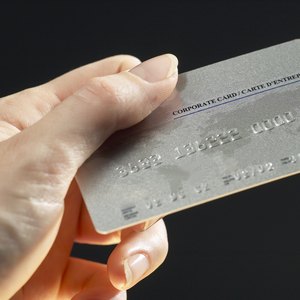
According to the U.S. Department of Justice, 7 percent of Americans suffered from debit card fraud in 2011. In response to the rise in credit card fraud, banks and credit lenders developed a means to protect cardholders called “hot carding.” Banks hot card debit cards to prevent unauthorized transactions, protecting the money of both the cardholder and the debit lender. Though it may present an inconvenience to the cardholder, hot carding is a strong security measure.
Frozen Funds
Credit card companies and banks closely monitor card transactions for suspicious activity. By hot carding, they immediately stop all access to debit card funds, including through online transactions and automated withdrawals. Even with the correct PIN number, a cardholder cannot withdraw money from an ATM with a card has been hot carded. For all practical purposes, hot carded debit cards are canceled. Debit card customers must order new debit cards to restore access to their funds.
How Debit Cards Become Hot Carded
Typically, banks only hot card a debit card when alerted by the debit card customer. When a cardholder loses a card, or if someone steals the card, the cardholder should alert the bank. Cardholders can alert companies by phone or online. Debit card customers usually have 24-hour access to card security measures such as hot carding. Customers will have to answer a few security questions to verify their identity, after which the bank will immediately freeze the card.
After a Hot Carding
Once a bank hot cards a debit card, the process is irreversible. The cardholder must order another card. The card provider will administer an inquiry about the stolen or lost debit card. After the bank obtains sufficient information, it will ask more security questions and update the account information. When the customer's identity has been verified, the bank will send a new debit card in the mail to replace the old one. If a customer later finds her lost or stolen card, the card should be destroyed and thrown away because it will remain unusable.
Effectiveness
Hot carding is an effective way to protect a debit card customer's assets because it immediately freezes an account. Unfortunately, thieves often use the information on a debit card to open new debit card accounts in the name of the cardholder. According to the Office of the Attorney General of Idaho, opening a new debit card account using the name on a stolen card represents the most common form of identity theft.
While all national and international banks offer hot carding, not all local banks provide this service. Debit card terms and conditions vary among regions. However, hot carding has proved to be so effective against identity theft that many states have ordered banks to provide this protection to debit card customers.
References
- U.S. Dept. of Justice: Consumer Sentinel Network
- VISA: Cardholder Support Services
- American Bar Association. "Automatic Teller Machines (ATMs) and the Law." Accessed March 24, 2020.
- CVV Number. "What Is My CVV Number and How Do I Find It?" Accessed March 24, 2020.
- Huntington National Bank. "How to Use a Debit Card: Online, ATM & Chip." Accessed March 24, 2020.
- Consumer Financial Protection Bureau. "What Is the Difference Between a Prepaid Card, a Credit Card, and a Debit Card?" Accessed March 24, 2020.
- Visa. "Visa Prepaid Reloadable Personal Cards." Accessed March 24, 2020.
- Consumer Financial Protection Bureau. "Understand the Fees You Will Pay." Accessed March 24, 2020.
- Federal Trade Commission. "Lost or Stolen Credit, ATM, and Debit Cards." Accessed March 24, 2020.
- Consumer Financial Protection Bureau. "What Is a Grace Period for a Credit Card?" Accessed March 24, 2020.
Writer Bio
Jacob Broadley started his career as a writer in 2008. Serving as the director of advertisement for the Louisville Cardinals for Life, Broadley has an extensive background in community assessment and commercialism. He won the 2009-10 Book-in-Common Essay Contest and the Trover Scholar Essay Contest in 2008. Broadley is completing his Bachelor of Science in cellular biology at the University of Louisville.

